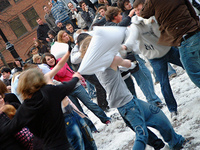Yesterday, my daughter Ella went to shul with me to attend a bat-mitzvah. (My younger daughter, Zoe, was home with 102° fever.) I wanted to see the bat-mitzvah girl read from the Torah, so we arrived significantly earlier than usual. By the end of the Torah service we both needed to take a break from the sanctuary, and since it was raining, we went for a walk in the halls instead.
There were a lot of kids in shul, which is inarguably a wonderful thing. And it was obvious that they feel very comfortable in the building. Also a wonderful thing. In concept, at least. But I was actually horrified (and I’m not easily horrified) by the behavior I saw in the hallways. The kids were running, and I do mean running, through the halls of our small shul. Also shouting. And chasing, with some occasional crashing thrown in for good measure. Which invariably led to a little more shouting.
Ella found a group of her friends from school huddled in the coat room. She asked if she could join them if she promised not to run around. I was torn. I want her to enjoy her time at shul, and to see it as a place of community for her, and not just for me. So, I said yes. But when I came back out a few minutes later and saw a handful of kids pushing a few other children out the coat room door (“First graders only!” they hollered) I reneged. I told her that I didn’t want her out of my sight, because even thought she wasn’t doing anything wrong, I wasn’t ok with the way the other children were behaving. We ended up sitting on the stage in the social hall, reading books, and waiting for kiddush.
Last night at the Bar- Mitzvah party I complained to another parent about what I saw. “Really?” she asked. “I like seeing the kids have fun in the building.” I understood her point. We both had grown up belonging to, or visiting, large suburban synagogues where children needed to sit quietly in stiff, fancy clothes. We both sought out a small, progressive community like ours to escape many of those expectations. But still.
I understand that every parent has his/her own behavior expectations, and other people, especially those without children, are likely to raise an eyebrow or shoot a look when children, well, act like children. I have been the object of many a stare in the main sanctuary when my daughters whispered, or rustled paper dolls, or ate the many snacks I brought to keep them quiet, back in the days when I still tried to go to services.
My questions is, can a community develop a shared expectation for behavior and still be welcoming to families? And if so, how do we actually uphold (I wanted to say enforce, but I think I’m sounding enough like Nurse Ratched for one post) these expectations?
Yesterday was one of the first times I actually considered giving up our membership. I can handle shul being a little boring, or vaguely dissatisfying. But I’m not ok with it being a bad influence. So please, share your comments and suggestions. I’d love to hear how you, or your synagogue, or church, has navigated this tricky balance.


